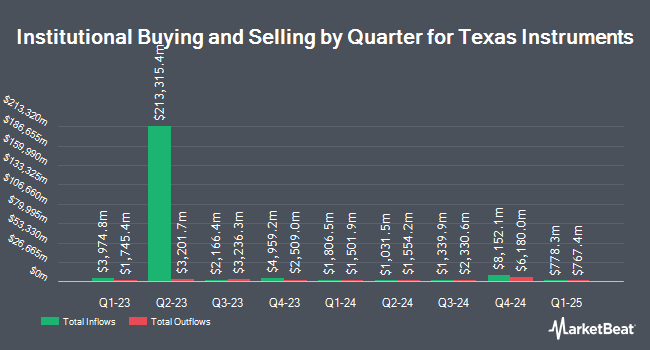Mcdaniel Terry & Co. lifted its stake in shares of Texas Instruments Incorporated (NASDAQ:TXN - Free Report) by 3.3% in the first quarter, according to the company in its most recent disclosure with the SEC. The institutional investor owned 88,137 shares of the semiconductor company's stock after buying an additional 2,851 shares during the quarter. Texas Instruments makes up approximately 1.4% of Mcdaniel Terry & Co.'s portfolio, making the stock its 26th biggest position. Mcdaniel Terry & Co.'s holdings in Texas Instruments were worth $15,838,000 at the end of the most recent reporting period.
A number of other institutional investors and hedge funds have also made changes to their positions in the stock. Vanguard Group Inc. grew its position in shares of Texas Instruments by 0.7% during the fourth quarter. Vanguard Group Inc. now owns 93,567,277 shares of the semiconductor company's stock worth $17,544,800,000 after buying an additional 649,620 shares in the last quarter. Geode Capital Management LLC grew its position in shares of Texas Instruments by 1.3% during the fourth quarter. Geode Capital Management LLC now owns 21,554,142 shares of the semiconductor company's stock worth $4,032,599,000 after buying an additional 267,352 shares in the last quarter. Charles Schwab Investment Management Inc. grew its position in shares of Texas Instruments by 11.6% during the fourth quarter. Charles Schwab Investment Management Inc. now owns 21,487,468 shares of the semiconductor company's stock worth $4,029,115,000 after buying an additional 2,237,035 shares in the last quarter. Norges Bank acquired a new position in shares of Texas Instruments during the fourth quarter worth about $2,584,490,000. Finally, Alliancebernstein L.P. lifted its stake in Texas Instruments by 6.9% during the fourth quarter. Alliancebernstein L.P. now owns 12,706,971 shares of the semiconductor company's stock worth $2,382,684,000 after purchasing an additional 822,797 shares during the last quarter. 84.99% of the stock is owned by institutional investors and hedge funds.
Analyst Upgrades and Downgrades
Several research firms recently weighed in on TXN. Benchmark decreased their target price on Texas Instruments from $230.00 to $200.00 and set a "buy" rating for the company in a research note on Thursday, April 24th. Baird R W upgraded Texas Instruments from a "hold" rating to a "strong-buy" rating in a research note on Monday, April 7th. Wells Fargo & Company set a $190.00 target price on Texas Instruments and gave the stock an "equal weight" rating in a research note on Monday, June 16th. Arete began coverage on Texas Instruments in a research note on Thursday. They set a "neutral" rating and a $203.80 target price for the company. Finally, Mizuho set a $170.00 target price on Texas Instruments in a research note on Thursday, April 24th. Four investment analysts have rated the stock with a sell rating, sixteen have issued a hold rating, nine have given a buy rating and two have assigned a strong buy rating to the stock. According to MarketBeat, the stock currently has a consensus rating of "Hold" and a consensus price target of $191.49.
View Our Latest Analysis on TXN
Texas Instruments Stock Performance
Shares of Texas Instruments stock traded up $0.77 during trading hours on Friday, hitting $207.08. 8,584,775 shares of the company were exchanged, compared to its average volume of 6,415,236. Texas Instruments Incorporated has a 1 year low of $139.95 and a 1 year high of $220.39. The company has a current ratio of 5.26, a quick ratio of 3.37 and a debt-to-equity ratio of 0.78. The business has a 50-day moving average of $182.58 and a 200-day moving average of $182.45. The stock has a market capitalization of $188.13 billion, a price-to-earnings ratio of 39.29, a P/E/G ratio of 3.37 and a beta of 1.00.
Texas Instruments (NASDAQ:TXN - Get Free Report) last released its quarterly earnings results on Wednesday, April 23rd. The semiconductor company reported $1.28 EPS for the quarter, topping the consensus estimate of $1.06 by $0.22. Texas Instruments had a return on equity of 28.75% and a net margin of 30.36%. The business had revenue of $4.07 billion during the quarter, compared to analysts' expectations of $3.91 billion. During the same quarter in the prior year, the business earned $1.10 earnings per share. The company's quarterly revenue was up 11.1% compared to the same quarter last year. As a group, analysts expect that Texas Instruments Incorporated will post 5.35 EPS for the current fiscal year.
Texas Instruments Announces Dividend
The business also recently declared a quarterly dividend, which was paid on Tuesday, May 13th. Stockholders of record on Wednesday, April 30th were paid a dividend of $1.36 per share. This represents a $5.44 annualized dividend and a dividend yield of 2.63%. The ex-dividend date was Wednesday, April 30th. Texas Instruments's dividend payout ratio (DPR) is presently 103.23%.
About Texas Instruments
(
Free Report)
Texas Instruments Incorporated designs, manufactures, and sells semiconductors to electronics designers and manufacturers in the United States and internationally. The company operates through Analog and Embedded Processing segments. The Analog segment offers power products to manage power requirements across various voltage levels, including battery-management solutions, DC/DC switching regulators, AC/DC and isolated controllers and converters, power switches, linear regulators, voltage references, and lighting products.
Featured Articles

Before you consider Texas Instruments, you'll want to hear this.
MarketBeat keeps track of Wall Street's top-rated and best performing research analysts and the stocks they recommend to their clients on a daily basis. MarketBeat has identified the five stocks that top analysts are quietly whispering to their clients to buy now before the broader market catches on... and Texas Instruments wasn't on the list.
While Texas Instruments currently has a Hold rating among analysts, top-rated analysts believe these five stocks are better buys.
View The Five Stocks Here
Market downturns give many investors pause, and for good reason. Wondering how to offset this risk? Enter your email address to learn more about using beta to protect your portfolio.
Get This Free Report
Like this article? Share it with a colleague.
Link copied to clipboard.
